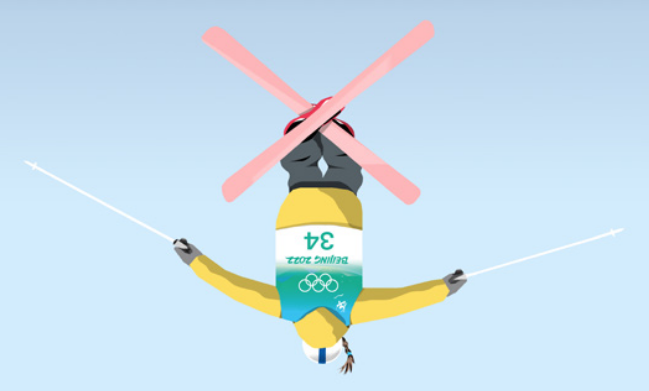OlymPicks: Key Takeaways From the Beijing 2022 Athletes' Playbook
In OlymPicks, we highlight news, gossip, and developments regarding the buildup to Beijing's 2022 Winter Olympics.
The International Olympics Committee (IOC) has just dropped the official Athletes Playbook for the Beijing 2022 Winter Olympics, and as in the previous Playbook, it’s jam-packed with all sorts of info on getting to China, attending the Games, and leaving China – but specially designed for athletes of course.
That being said, if reading through more than 70 pages of material is how you get your kicks in your spare time, read it here.
If not, then you’re in luck, ‘cause we’ve got a few takeaways.
Close contacts can still participate
If one gets sick, will it have the potential to take the whole competition down?
In short, no.
On page 38 of the document, it says if a close contact of an infected individual is found, they’ll still be allowed to compete and participate, albeit under slightly more restrictive conditions.

A close contact will need to quarantine in a single room, use dedicated vehicles to go to and from competition and event venues, dine alone, wear a mask at all times (unless training and competing) and maintain a safe distance from others when competing or otherwise intermingling.
On top of this, close contacts will be required to check and submit their temperature every two hours and take a PCR test every 12 hours, with testing reverting to normal after seven consecutive days of no positive tests.
This all means that even if, say, one or two members of a country’s ice hockey team are confirmed as close contacts, it won’t eliminate the whole team from competing.
Athletes, coaches and other participants will have a special app to use
Prior to their arrival in the capital, athletes are asked to download and begin using a special Beijing 2022 smartphone app called My 2022, designed to make their stay more convenient.
According to the Playbook, the app includes info provided by the Beijing 2022 Organizing Committee, the city of Beijing, and general information on the Games. It also has a special Health Monitoring System (HMS), which athletes are requested to begin using 14 days prior to their departure to China.
Bring in the liaison officers
Aside from the My 2022 app, athletes and participants will also have access to COVID-19 Liaison Officers (CLOs), all of whom are going to have a lot of work on their hands even before the Games kick off in February.

CLOs are to act as liaisons between Games participants and the myriad groups overseeing events and COVID-19 controls, including the Organizing Committee, IOC offices, Chinese CDC and a Medical Expert Panel (MEP) of 20 experts who will oversee potential “complex” COVID cases.
Athletes will be in touch with CLOs from the time they begin planning their journey to the time they exit China and return home, with CLOs ensuring that there’s a solid understanding of the Playbook, travel and testing procedures, and other rules to be in place during the Games.
Testing, testing and more testing
Speaking of testing procedures, athletes will be plenty used to getting their noses and throats jabbed by the time the Olympics and Paralympics are through.
Before departing, two PCR tests must be taken 24 hours apart, and at least 96 hours before departing to China or the first connecting flight. Then, another test must be taken 72 hours before the flight or connecting flight into China.

Testing locations must be approved by the Chinese Embassy or Consulate in the country participants are coming from.
Then, after arrival in Beijing, another test will be administered, with subsequent tests administered each day throughout the Games until everyone heads home.
A hazy definition of “fully vaccinated”
Early on in the document, there’s a line about fully vaccinated athletes and support staff participating in the Olympics, which more or less suggests that participants are considered fully vaccinated according to the rules of their country or region of origin.
It goes on to say that while it’s strongly recommended folks get a booster shot before coming, local regulations reign supreme.
As confusing as this might be, especially considering China’s drive to administer boosters, it’ll be interesting to see how this plays out in practice for those arriving to compete.
Clue as to who can spectate at the Winter Games?
Finally, one asterisk-sized tidbit that might hold some clue as to an earlier announcement about “residents of China” being the only people allowed to buy tickets.
While the section itself concerns residents of China who enter the closed loop to take part in Games support and other matters, at the bottom of the page there’s this line:
“Includes Games participants who enter China before 4 January 2022, have stayed for more than 21 days and are entering the closed loop.”

Earlier in the year, when Chinese mainland residents were mentioned as the only ones who could spectate at the Games, there was a massive hullabaloo as foreign residents – even expats residing in China – speculated they would be forbidden from attending the Games.
This small line might be mere speculation, but seeing as it includes “Games participants,” this should include foreign participants residing in China as well – so even though it’s still too early to tell who can spectate, this, in our opinion, is a sign that all that worry could be over nothing.
READ: OlymPicks: Q&A With Beijinger & China Ice Hockey Team Member Simon Chen
Images: IOC







